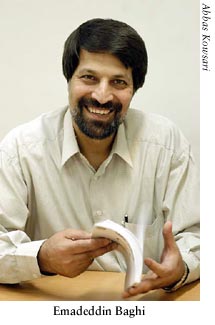New York, October 12, 2004—The Committee to Protect Journalists strongly protests a travel ban imposed on Iranian journalist and human rights activist Emadeddin Baghi, who was due to be honored here today with an award recognizing his courage in fighting injustice.
Iranian officials confiscated Baghi’s passport at Tehran’s airport on October 4, and prevented him from leaving Iran. Without giving an explanation, a state security agent informed the journalist that a court order barred him from traveling out of the country, according to news reports
The ban blocked Baghi from traveling to the United States and Europe where he was to take part in several meetings on human rights, according to press reports. An independent journalist and author of 20 books, Baghi heads the Committee for Defense of Prisoners Rights, an organization that helps defend intellectuals imprisoned for espousing pro-democracy ideas and opinions. He was scheduled to meet European Union officials working on human rights, and to attend meetings on the subject in the Netherlands, the United States, and Canada, according to Agence France-Presse.
Baghi was also scheduled to receive the Civil Courage Prize from the Northcote Parkinson Fund, which honors “steadfast resistance to evil at great personal risk,” at a ceremony in New York today, according to the prize Web site.
Baghi was jailed by Iranian authorities in 2000 and held for nearly three years for publishing articles about the role of Intelligence Ministry agents in the 1998 murders of several Iranian intellectuals and dissidents. Since his release from prison in February 2003, Baghi has been subjected to ongoing surveillance and harassing court summonses related to his published work.
“Iranian authorities continue to persecute Emadeddin Baghi, even now that he is out of prison, ” CPJ Executive Director Ann Cooper said. “Although it is too late for Emadeddin Baghi to receive his well-deserved Civil Courage Prize, we urge Iranian authorities to lift this travel ban immediately. The harassment must stop and authorities must allow him to travel and work freely.”
